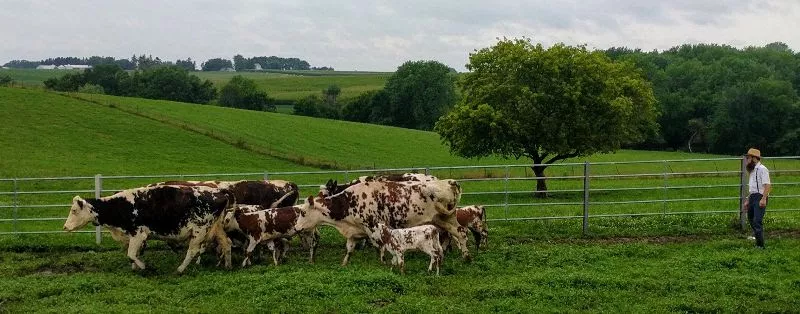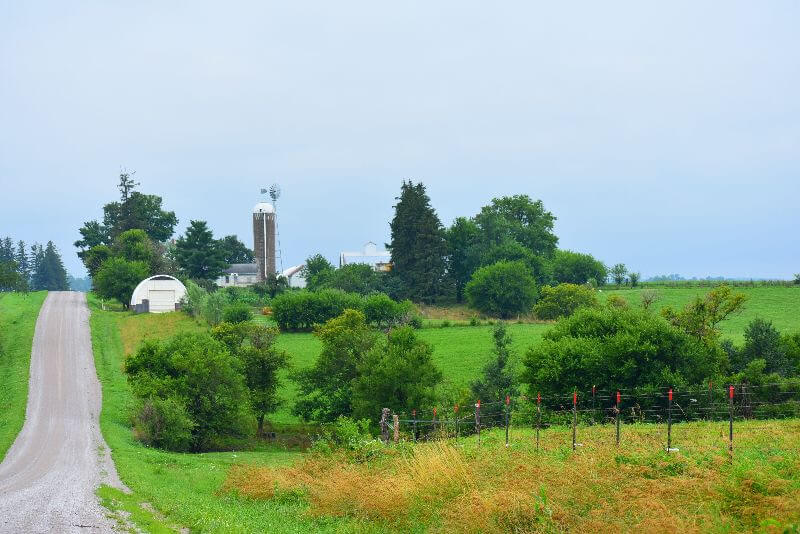
“Our herd is 100% grass-fed,” says David Miller, “Our cows graze on pasture for as much of the year as possible, and in the winter they eat the same forage that we’ve baled up from our farm.”
The Miller Family Farm consists of about 145 acres that he rotates between crops and pasture. Today, at the end of Spring about one third of the grass is being harvested and baled up by David and his son.
“Grass” barely begins to cover the complexity of what is grown and harvested here – for the benefit of cows and people.
What grasses do cows eat?
Our family farms feed cows differently,” says Joe Miller as he crouches down encouraging us to look closer. Joe (no relation to David) is Kalona SuperNatural’s Brand and Sales Manager. He started milking cows at age 9 and is a veritable Google of information on the dairy industry as well as a foodie.
“We want our cows on pasture; naturally enjoying the fresh grass and beautiful sunshine. On the pasture, the cows enjoy a salad bar of grasses, flowers and herbs. The cow can choose what she is hungry for and needs at any point of the day. And just as importantly, she is allowed to roam free throughout the pasture instead of being confined to a barn.”
Is grass farming easy?
Feeding cows mostly grass grown on pasture takes a lot of thought and patience. Farmers like David have to have an enormous amount of skill – more akin to expert chefs, dieticians, and horticulturists. They need to create a mix of types of plants that meet the cows health requirements and grow as long as possible during the year.
Crouching on the pasture, we look closely for the plants with long slender leaves coming off stems. Those are a mixture of native and European cool and warm weather grasses. The plants with broad leaves are protein packed legumes like alfalfa and clover. Plants grow at different rates in different seasons and soil conditions so this diversity allows cows to graze on fresh plants longer throughout the year.
Why is grass important for cow health?
A cow’s digestive system was primarily designed to easily extract carbohydrates and proteins from grass and comfortably convert them into nutrient dense milk. When allowed to graze freely on pasture, cows thrive in the low-stress environment.
Grazing and digesting grass is a natural process for cows that occurs on David’s organic dairy farm.
What is the difference between small organic farms and large conventional dairy operations?
On conventional dairy farms that produce non-organic, non-grass-fed milk, up to 45% of a cow’s diet may be grains. Conventional operations do this because they can pack a lot of cows into feedlots rather than pasture. Grain also allows them to produce more milk per cow more cheaply.
The problem is that feeding cows a lot of grain is like flipping a switch that ramps up the acidity in the cow’s digestive system – according to some studies by as much as 10x. A heavy grain fed diet may also activate grain digesting microbes while shutting down grass-digesting microbes.
Why can cows digest some grain?
Cows developed the ability to digest grain because in the wild doing so allowed them to survive drought conditions when the seeds (grains) of plants were the only food available. But pushing their digestive system into that situation all the time adds a lot of stress to the cows.
Is feeding (ANY) grain to cows bad?
Not necessarily. It really depends on the kind and amount. A little bit of organic grain like cows would get from seeds on pasture isn’t bad especially if they need extra energy to get through a long winter. On our farms, cows may be fed small amounts of a variety of organic grains and vegetables usually grown on their own or family members’ organic farms.
Do you like chocolate?
Here’s a good analogy – you might eat organic, dark chocolate in the winter to boost your mood, and that’s fine! But it wouldn’t be healthy for you to gorge on processed chocolate candy bars all winter. You’d get that initial burst of energy, but eventually would crash from the sugar high, have less energy, pack on weight, and be unhappy. The same thing happens when a cow is fed too much grain.
What’s the result of a grass-fed diet?
Grass-fed, pasture grazed cows are happier and healthier. They produce more nutrient dense food for you.
You’ll taste the difference – so look for organic dairy from grass-fed cows, pasture-grazed small family farms – that also do not ultra-high temperature pasteurize (sterilize) their milk or homogenize it. If your milk has a cream-top and is low-temp pasteurized, that means more of the grass-fed goodness is retained!
Next time — how our small organic farms are ecological oasis that protect the environment and regenerate our midwest ecosystems.
This is David Miller’s farm. It’s down the road and around the way from our little office.

